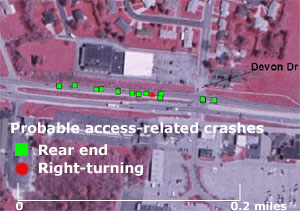Researchers
David Plazak
Christopher Kukla
Jamie Luedtke
Jonathan Rees
About the research
Managing existing and newly constructed highway corridors has recently become a significant concern in many states, including Iowa. As urban land and land on the urban fringe develops, there is pressure to add features such as commercial driveways, at-grade public road intersections, and traffic signals to arterial highway routes that should primarily serve high-speed traffic. This diminishes the speed and traffic capacity of such roadways and can also cause significant safety issues. If mobility and safety are diminished, the value of the highway investment is diminished. Since a major highway corridor improvement may cost tens of millions of dollars or more, corridor management is as critical to preserving that investment as such more hard side management practices as pavement or bridge management.
Corridor management is a process that applies access management principles to highway corridors in an attempt to balance the competing needs of traffic service, safety, and support for land development. This project helped to identify routes that should be given high priority for corridor management. The pilot study in the form of two corridor management case studies provides an analytical process that can be replicated along other Iowa commuting corridors using commonly available transportation and land use data resources. It also offers a general set of guidelines for the Iowa Department of Transportation to use in the development of its own comprehensive corridor management program.
